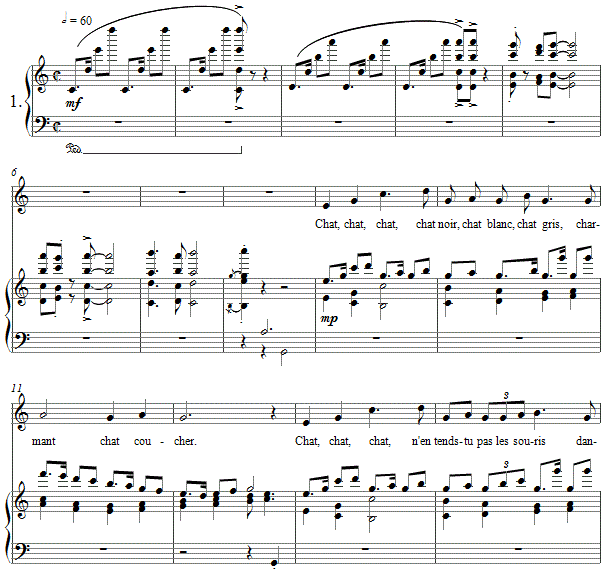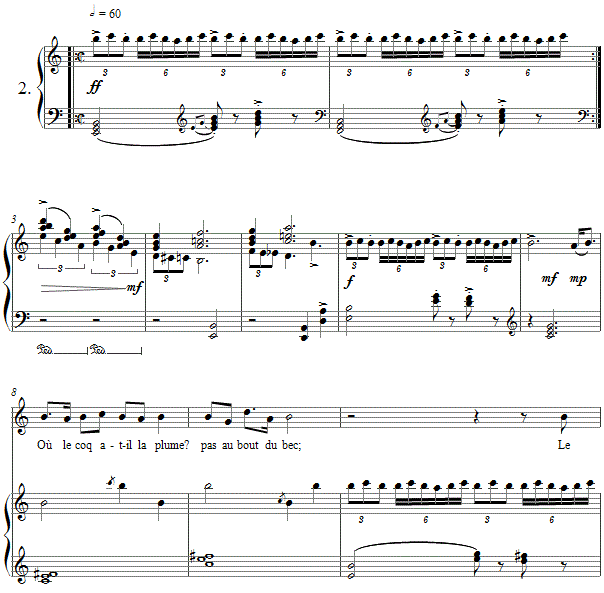Music and Texts of GARY BACHLUND
Vocal Music | Piano | Organ | Chamber Music | Orchestral | Articles and Commentary | Poems and Stories | Miscellany | FAQs
Deux Chansons - (2011)
Tristan Klingsor
medium voice and piano
i. Chat, chat, chat
Chat, chat, chat,
Chat noir, chat blanc, chat gris,
Charmant chat couché,
Chat, chat, chat
N'entends-tu pas les souris
Danser à trois les entrechats
Sur le plancher?
Le bourgeois ronfle dans son lit
De son bonnet de coton coiffé
Et la lune regarde à la vitre:
Dansez souris, dansez jolies,
Dansez vite,
En remuant vos fines queues de fées.
Dansez sans musique tout à votre aise
À pas menus et drus
Au clair de la lune qui vient de se lever,
Courez: les sergents de ville dans la rue
Font les cent pas sur le pavé
Et tous les chats du vieux Paris
Dorment sur leur chaise,
Chats blancs, chats noirs, ou chats gris.
ii. Où le coq a-t-il la plume?
Où le coq a-t-il la plume?
Pas au bout du bec;
Le bois n'est pas sec,
La cheminée fume;
Où le coq a-t-il la plume?
Dans les doigts de la servante
Qui l'arrachent au croupion bleu;
Où le coq a-t-il la plume?
L'eau dans la marmite chante
Sur le feu.
Où le coq a-t-il la plume?
Sur le vieux volant de bois
Qu'on jette jusqu'en haut
Du toit;
La cheminée fume
Et la soupe bout sans bruit dans le pot:
Où le coq a-t-il la plume?[ 7 pages, circa 4' 55" ]
Tristan Klingsor
Tristan Klingsor is the pseudonym for Arthur Justin Léon Leclère (1874-1966), a multi-talented French poet, composer, painter and art critic, best known today for his texts used in Ravel’s song cycle Shéhérazade (1905). These delightful humoresques and many of his other poems have been set by Koechlin, Hüe and Migot, as well as Ravel.
Cat, cat, chat,
black cat, white cat, gray cat,
charming, reclining cat -
cat, cat, cat,
do you not hear the mice
dancing and weaving in threes
on the floor?
The burgher is snoring in his bed
beneath a cap of cotton,
and the moon is gazing through the window:
dance, my mice - dance, my pretty mice,
dance quickly,
flicking your fine, magical tails.
Dance without music, completely at ease,
to the sound of your light steps;
in the light of the moon that has just risen,
run! the soldiers of the village in the street
are marching about the town;
and all the cats of old Paris
are asleep in their chairs:
white cats, black cats, or gray cats.
Translation from French to English copyright © Emily Ezust, of the Lied, Art Song, and Choral Texts Page.
A small, folk-song like melody is introduced by simple, widely diatonic arpeggios, and then a diatonic three-part texture. A middle section moves away into a dance-like A major, and return in the tonic and reprise of the first lines.
Where's that feathered cockerel gone?
Not more than a beak;
The wood's not dry,
The chimney smokes;
Where's that feathered cockerel gone?
In the busy fingers of a maid
Who plucks its backside bare;
Where's that feathered cockerel gone?
Water in the pot sings
Over the fire.
Where's that feathered cockerel gone?
High over old woody brush
Quite like that which makes
The roof's thatch;
The chimney smokes
And the soup bubbles noisily in the pot;
Where's that feathered cockerel gone?
gb
A fiery gesture boils its way through this setting, for we all know where the bird is, plucked and soon ready for serving. Shall the text speak with discomfort in sympathy for the bird? At annoyance for its being slaughtered for a meal? Or shall it be read as with an urgent waiting for the recipe's glories to be fully revealed in the final analysis?
The score for is available as a free PDF download, though any major commercial performance or recording of the work is prohibited without prior arrangement with the composer. Click on the graphic below for this piano-vocal score.


